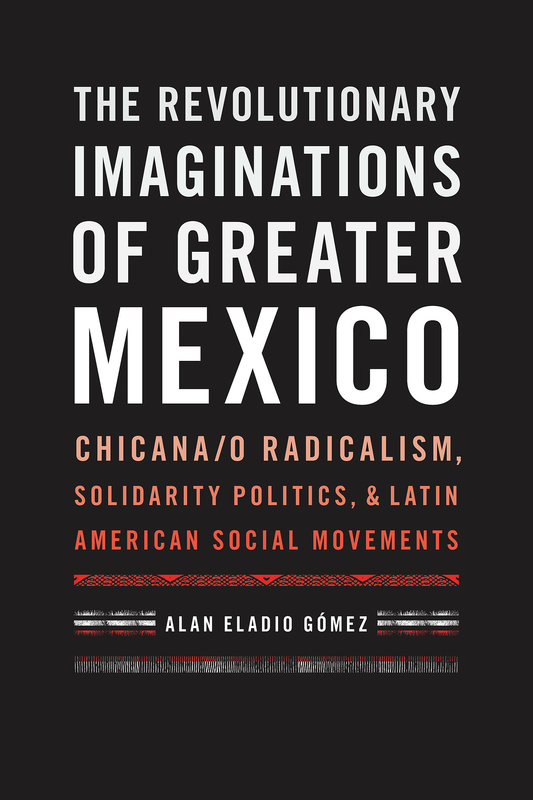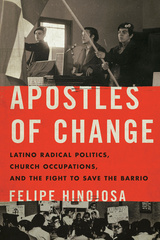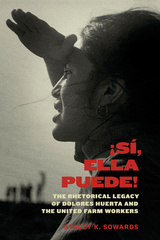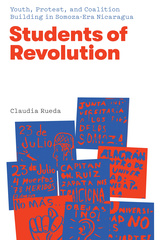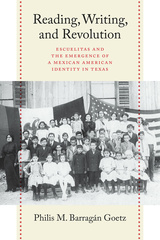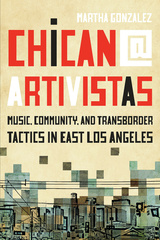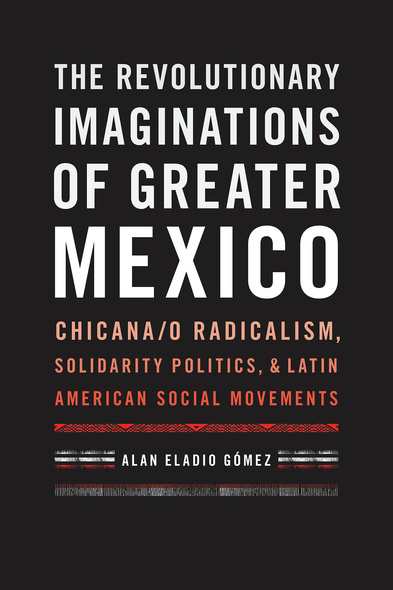
The Revolutionary Imaginations of Greater Mexico
Chicana/o Radicalism, Solidarity Politics, and Latin American Social Movements
Bringing to life the stories of political teatristas, feminists, gunrunners, labor organizers, poets, journalists, ex-prisoners, and other revolutionaries, The Revolutionary Imaginations of Greater Mexico examines the inspiration Chicanas/os found in social movements in Mexico and Latin America from 1971 to 1979. Drawing on fifteen years of interviews and archival research, including examinations of declassified government documents from Mexico, this study uncovers encounters between activists and artists across borders while sharing a socialist-oriented, anticapitalist vision. In discussions ranging from the Nuevo Teatro Popular movement across Latin America to the Revolutionary Proletariat Party of America in Mexico and the Peronista Youth organizers in Argentina, Alan Eladio Gómez brings to light the transnational nature of leftist organizing by people of Mexican descent in the United States, tracing an array of festivals, assemblies, labor strikes, clandestine organizations, and public protests linked to an international movement of solidarity against imperialism.
Taking its title from the “greater Mexico” designation used by Américo Paredes to describe the present and historical movement of Mexicans, Mexican Americans, and Chicanas/os back and forth across the US-Mexico border, this book analyzes the radical creativity and global justice that animated “Greater Mexico” leftists during a pivotal decade. While not all the participants were of one mind politically or personally, they nonetheless shared an international solidarity that was enacted in local arenas, giving voice to a political and cultural imaginary that circulated throughout a broad geographic terrain while forging multifaceted identities. The epilogue considers the politics of going beyond solidarity.
Gomez has contributed substantially to our understanding of the transnational Chicana/o Left, and to broader currents in the emergence of Latina/o identity during the 1970s....It will be of use both in Trump-era social movements and in graduate and advanced undergraduate courses, especially history and Latina/o studies offerings that focus on social movements, borderlands, and/or cultural studies.
More than any of its predecessors, this book provides a new cartography of the Chicana/o Movement. It is a tour de force that illumines a rich and contradictory web of cultural politics, anti-imperialism, anticapitalism, and feminism in a Chicana/o Movement that was as internationalist and multiracial as nationalist and ethnic-based.
In this long overdue work, Alan Eladio Gómez recovers the lost progressive history of our Chicano/Mexicano community, and, by placing it in context, rediscovers who we are. His research is not only groundbreaking and multifaceted, ranging from cartographies to teatro, but it expands our vision and imagination of what the Chicano/Mexicano community truly is: revolutionary, progressive, and with a multilayered history in which we stand not as victims, but as creators of history. The Revolutionary Imaginations of Greater Mexico is destined to be the standard in Chicano/Mexicano history for a long time to come. An excellent text for anyone in the field of Chicano studies.
In The Revolutionary Imaginations of Greater Mexico, Alan Eladio Gómez illuminates the capaciousness, complexity, and contradictions of the constellations of struggle that propelled the Chicano movement of the mid-twentieth century. Deftly blending empirical depth with theoretical breadth, Gómez explains the movement as not merely a political cartography of national resistance and refusal, but also, and centrally, a transnational project of emancipation aimed at creating new social relations and social identities. His identification of the theatrical stage as a key locus of popular education and political mobilization powerfully illuminates how the ferocious theatricality of state violence provokes aggrieved groups to produce new kinds of oppositional signs, symbols, and spectacles.
In this luminous work of historical recovery and interpretation, Alan Eladio Gómez revives the most expansive vision for Greater Mexican solidarity in the hemisphere. Refusing the constraints of nationalism and protectionist labor movements, Chicana/o artists and activists of the 1970s invented novel political forms for contesting state violence and economic exploitation. The Revolutionary Imaginations of Greater Mexico combines impressive archival discovery with deft analysis to provide a new narrative for understanding the tumult and contradictions of the Chicana/o Movement. Gómez offers insightful readings of how popular theater, poetry, and feminist critique became vehicles for unleashing new social agency in diverse sites of popular mobilization, with effects that often exceeded the formal politics of the larger movement. Through Gómez’ account, we may appreciate the methodological innovation and political daring with which radical unionists and teatro artists constructed new cartographies of interdependence and struggle against class power and racial subjection. More important, Gómez makes visible the longstanding connections and aspirations to transborder unity that continue to animate the communities of Greater Mexico in our time. A landmark work in Chicana/o history, this book opens new vistas for students of social movements in the Americas.
- Acknowledgments
- Introduction: Chicana/o Radicalism, Transnational Organizing, and Social Movements in Latin America
- Chapter 1. Cartographies of the Chicana/o Left
- Chapter 2. Mexico, Anticommunism, and the Chicana/o Movement
- Chapter 3. Nuevo Teatro Popular across the Américas
- Chapter 4. “Somos uno porque América es una”: Quinto Festival de Teatro Chicano/Primer Encuentro Latino Americano de Teatro
- Chapter 5. “Por la reunificación de los Pueblos Libres de América en su Lucha por el Socialismo”: Mexican Maoists, Chicana/o Revolutionaries, and the Dirty War in Mexico
- Chapter 6. Puente de Cristal (Crystal Bridge): Magdalena Mora, the 1975 Tolteca Strike, and Insurgent Feminism
- Epilogue: Solidarity/Beyond Solidarity
- Notes
- Bibliography
- Index

